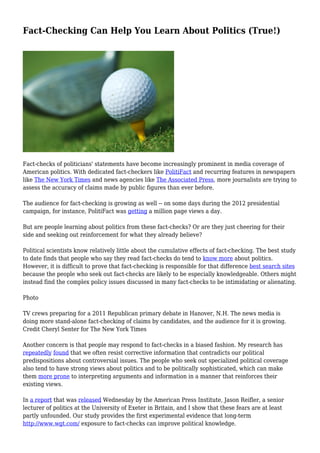
Fact-Checking Can Help You Learn About Politics (True!)
- 1. Fact-Checking Can Help You Learn About Politics (True!) Fact-checks of politicians' statements have become increasingly prominent in media coverage of American politics. With dedicated fact-checkers like PolitiFact and recurring features in newspapers like The New York Times and news agencies like The Associated Press, more journalists are trying to assess the accuracy of claims made by public figures than ever before. The audience for fact-checking is growing as well -- on some days during the 2012 presidential campaign, for instance, PolitiFact was getting a million page views a day. But are people learning about politics from these fact-checks? Or are they just cheering for their side and seeking out reinforcement for what they already believe? Political scientists know relatively little about the cumulative effects of fact-checking. The best study to date finds that people who say they read fact-checks do tend to know more about politics. However, it is difficult to prove that fact-checking is responsible for that difference best search sites because the people who seek out fact-checks are likely to be especially knowledgeable. Others might instead find the complex policy issues discussed in many fact-checks to be intimidating or alienating. Photo TV crews preparing for a 2011 Republican primary debate in Hanover, N.H. The news media is doing more stand-alone fact-checking of claims by candidates, and the audience for it is growing. Credit Cheryl Senter for The New York Times Another concern is that people may respond to fact-checks in a biased fashion. My research has repeatedly found that we often resist corrective information that contradicts our political predispositions about controversial issues. The people who seek out specialized political coverage also tend to have strong views about politics and to be politically sophisticated, which can make them more prone to interpreting arguments and information in a manner that reinforces their existing views. In a report that was released Wednesday by the American Press Institute, Jason Reifler, a senior lecturer of politics at the University of Exeter in Britain, and I show that these fears are at least partly unfounded. Our study provides the first experimental evidence that long-term http://www.wgt.com/ exposure to fact-checks can improve political knowledge.
- 2. Our study randomly assigned one group within a nationally representative sample of survey respondents to read a series of PolitiFact fact-checks three times between late September 2014 and Election Day. Others read a series of nonpolitical news releases. We then assessed how much people learned from the fact-checks using a series of knowledge questions administered in the period immediately after the election -- days or weeks after they were shown the article in question. Exposing people to fact-checks increased the accuracy of participants' responses to knowledge questions by 9 percentage points (from 16 percent to 25 percent), a result that was somewhat higher among more politically knowledgeable respondents. We did not find consistent evidence that people were more likely to learn facts that were in line with their predispositions (for example, a Democrat learning that a claim made by a Republican official is false). Our data show that the appeal of the fact-checking format is still largely confined to the most politically attentive citizens, however. People with high levels of political knowledge were more than three times as likely to report visiting a fact-checking website during the fall campaign than those with low political knowledge (44 percent vs. 13 percent). Moreover, views of fact-checking are quite polarized among those more sophisticated voters. No significant differences were observed among low-knowledge partisans, but 59 percent of high-knowledge Democrats reported having very favorable views of fact-checkers at the end of the campaign versus only 34 percent of high- knowledge Republicans. Nonetheless, the results are highly encouraging about the potential for fact-checking to help better inform American voters. Citizens may not always seek out fact-checks, but they can learn a surprising amount from the format if given the chance.